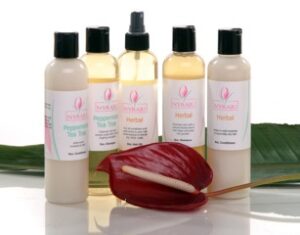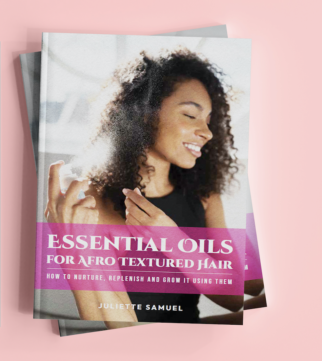 So you have made the decision to go natural with your hair, perhaps after years of mastering (or not mastering!) the relaxing/roller setting/blow-drying routine.
So you have made the decision to go natural with your hair, perhaps after years of mastering (or not mastering!) the relaxing/roller setting/blow-drying routine.
You have done your research on natural black hair care: you have been dutifully wearing your satin night cap, you have finally got your hair maintenance regimen down pat and your tresses were coming along nicely.
But your scalp is itching and flaking and your hair is looking a bit lackluster lately. What gives?
A dry scalp can be caused by several conditions including dandruff, seborrheic dermatitis, ringworm, and scalp psoriasis.
There are particular scalp challenges in black hair care. We tend to have dryer, coarser hair and in our efforts to moisturize our hair and get the sheen we want, we often overload our scalps with product.
In people of color, the embarrassing white or reddish flakes from dry scalp tend to be more noticeable in our hair and on our skin. (If your scalp itching and flakiness is severe, resist the temptation to self-diagnose and self-medicate, see a dermatologist – you may require a prescription remedy.) However, in many cases, you can significantly alleviate the situation by tweaking your regimen.
In general, your scalp produces sebum naturally and in the exact quantities required. Very often, dry scalp conditions like the ones mentioned above result from external/environmental factors or habits.
Therefore, when you apply too much oil – or the wrong oils – in an effort to combat the dryness, you prevent the scalp from working as it is designed to, and, in turn, more dryness occurs.
So how best to transition from a dry to a healthy scalp?
Try the following the tips:
- Wash hair once a week with a sulfate-free, paraben-free, fragrance-free clarifying shampoo.
Clarifying shampoos are great for cleansing the scalp. Apply to the scalp only (not to hair shaft, unless there is a lot of sweat or product build-up you want to remove). Clarifying shampoos that contain coal tar or salicylic acid or tea tree oil are especially effective. Consider using a co-wash – they tend to be less drying.
Don’t use very hot water on the hair. (Or the skin, actually – it’s drying all round.)
- Add Apple Cider Vinegar (use the organic, raw and unfiltered types) to your final rinse.
Apple cider vinegar has a similar PH level to our natural scalp sebum (between 4.5 and 5.5), so it is extremely helpful and effective in normalizing a dry scalp and combating bacterial or fungal infections. An added bonus: it is purported to be good at detangling hair and stimulating circulation to the hair follicles.
Try this rinse formula:
Shampoo, condition and rinse your hair thoroughly, as recommended.
Mix four tbsp. of apple cider vinegar in one cup of water and gently, pour over the scalp and massage in. After two minutes, rinse thoroughly with lukewarm water.
And don’t fret about that vinegary smell – it dissipates after a few minutes.
- Gently massage the scalp to increase circulation and encourage sebum production; leave scalp free of oils for five to ten days.
Leaving the scalp clear is an important investigative step. You may find that your scalp regularizes itself and the dryness resolves. Massage, meanwhile, is extremely beneficial in any event, so do tend to your scalp in slow, circular motions, with the balls of your fingers. If after ten days, the dryness persists, you may introduce minimal amounts of essential oils (cedarwood, rosemary and cypress are particularly excellent for treating dry scalp conditions) mixed with a carrier oil – try virgin, unrefined coconut oil. Dip fingertips into the oil mix and gently massage scalp for 10 – 15 minutes.
Do not apply oils daily – it is not necessary and will create build up.
Use any oil residue on the shaft of your hair.
- Avoid use of hair color/dyes
If you simply must have those ash blonde streaks, keep them far from your scalp/roots. Natural, henna or vegetable dyes are far gentler than peroxides, but the same rule applies when dealing with chronic scalp issues.
- Wearing protective styles? Switch it up, don’t micro-braid or pull tightly.
Your scalp is easily stressed – and as many of us know, traction alopecia affects significant numbers of black women who may have spent years cornrowing or braiding their hair. The practicalities of wearing one’s hair natural vary greatly according to length and texture, but if you can, try switching out twists or plaits for a simple bandeau or ribbon, or an afro.
Avoid hair combs in general – they tend to pull and cut, minutely, and may also scratch the scalp as you slide them into place. Use hair pins with care. Use natural boar bristle brushes and thick-toothed combs only. Try not to scratch!
- Consider your diet
Do your best to ensure that your diet contains Omega 3 Fatty Acids (from salmon, sardines, walnuts), Vitamin A (leafy, green vegetables, milk, eggs), Selenium (butter, garlic, shrimp, salmon, pork) and zinc (beef, lamb, nuts). All these goodies help to alleviate and prevent dry skin/scalp. (These same nutrients help prevent wrinkles – so your skin will thank you, too!)
That’s it for this week. Be kind to a friend or two and share what you’ve read. Their scalp will thank you for it. Until next time.
Dedicated To Your Beauty
Juliette Samuel
Esthetician/Author/Publisher




 Facebook
Facebook Twitter
Twitter Delicious
Delicious Digg
Digg Myspace
Myspace StumbleUpon
StumbleUpon Youtube
Youtube